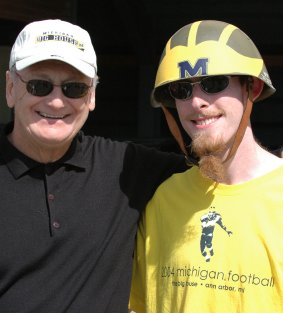On Friday, November 17, just one day before the Michigan/Ohio State game, former Michigan football coach Bo Schembechler died shortly after being rushed to the hospital. When I heard the news, I was shocked. Bo gone? It seemed surreal.
When I left the office, I turned on an Ann Arbor AM sports station. They had caller after caller, some former players and some longtime fans, recounting memories of Bo. The countless memories of Bo were moving; as I listened to emotional callers recall their pieces of Bo’s history, I thought of my own brief encounter with him.
After spring practice one year, I happened to spot him signing autographs and posing for pictures outside the press box. I joined the crowd, and, after a good-natured comment about my lengthy beard, he signed my Michigan-themed army helmet and posed for a picture. It was a brief encounter, but it was one I have not forgotten. I, the self-appointed Sgt. Wolverine, was fortunate enough to meet Bo Schembechler, the great general (retired, but not inactive) of Michigan football. It was a good day.
As that memory mixed with those I was hearing on the radio, tears came to my eyes. I had met him only once, so I knew him only through his immeasurable contributions to Michigan football history; still, the reality of his death brought surprisingly deep emotions to the surface.
It is easy to understand why hundreds of his former players mourn his passing. The endless stories of Bo both as a tough coach and as the most loyal of friends paint a picture of a man who both possessed and taught character and integrity, a man who acted consistently and demanded the same from those around him, and, as such, a man whose passing is rightly and deeply mourned by those who knew him. But I have mourned a man I met only once, a man who coached a team for which I never played, a man whose name is indelibly imprinted upon a university I never attended.
Why do I miss a man I barely knew?
I know I am not alone. On the Tuesday following his death, the university hosted a public celebration of his life; over 10,000 people made the trip to Michigan Stadium to remember Bo. The heart of the crowd was his family, his former players and coaches, and his friends; other coaches from rival schools, like USC’s John Robinson, Michigan State’s George Perles and Ohio State’s Jim Tressel, also came to honor Bo.
But also among those saying one final farewell were those who, like me, might have met him only once, or perhaps never even had the opportunity to meet him — those who know his fingerprints on the Michigan football program far more than they knew him.
Sunday afternoon, two days after Bo’s death, I donned my army helmet and coat and visited Schembechler Hall to see the growing number of tributes in front of the building. Both the collection of items — such as hats, sweatshirts and pictures — and the accompanying messages were touching. Many thanked Bo for his years at Michigan and told him he would be missed; one man left a note that said, “Now my dad has someone to watch UM games with.” As I spent time at the display reading sentiments like that, I found myself crying yet again. This time, I had company.
As I was taking a few pictures, a husband and wife approached the display. With tears in his eyes, he left his own piece of Michigan — a 1997 national championship hat — as his tribute to Bo. He then rejoined his wife, and they stood together for a few minutes, just gazing at the many items left in memory of Bo. They walked slowly past the display, reading the messages, and seemed to be ready to leave. But before they left, he approached me, held out his hand and, in a cracking, unsteady voice, said, “Go Blue.”
We didn’t say much; he told me he had seen me at a few football games, and I showed him the Bo emblem I’d painted on my helmet after I heard the news. That was it. But we didn’t need to say much. We simply stood together for a moment, two strangers who sought no introduction, instead needing only to know that we held a common grief. Neither of us knew the other’s connection with Bo or Michigan football that made us feel a sense of loss; we knew only that we both felt that loss, and that there was something meaningful in those few moments in which we were able to share our grief.
On a larger scale, the gathering at the stadium held similar significance. It was described as a celebration of Bo’s life, but it was not all laughter; there was still room for tears. Current coach Lloyd Carr and former player Jamie Morris both had to pause to fight back tears when they spoke, and Shemy, Bo’s son, broke down several times as he talked. Others in the crowd cried quietly.
It was important not what we did on Tuesday, but that we did it together. We laughed and we cried, and we did so together, an extended family of players, coaches and fans, over 10,000 strong. Many of us did not know him well, but we all were familiar with the football program he commanded for 21 seasons, and that is the thread that brought us together to remember the man we knew or to get to know the man we wish we’d known while he was alive. Whether we had come out of love for Bo or for Michigan football, in the end we had come for much the same reason: Bo and Michigan football are inseparable.
And so we come back to the original question, a question whose answer is actually quite simple. Why do I miss a man I barely knew?
I miss him because I know the legacy he left, and I can see it every time another Michigan football team takes the field. I did not know him, but I know Michigan football; I miss him because Michigan football misses him.


